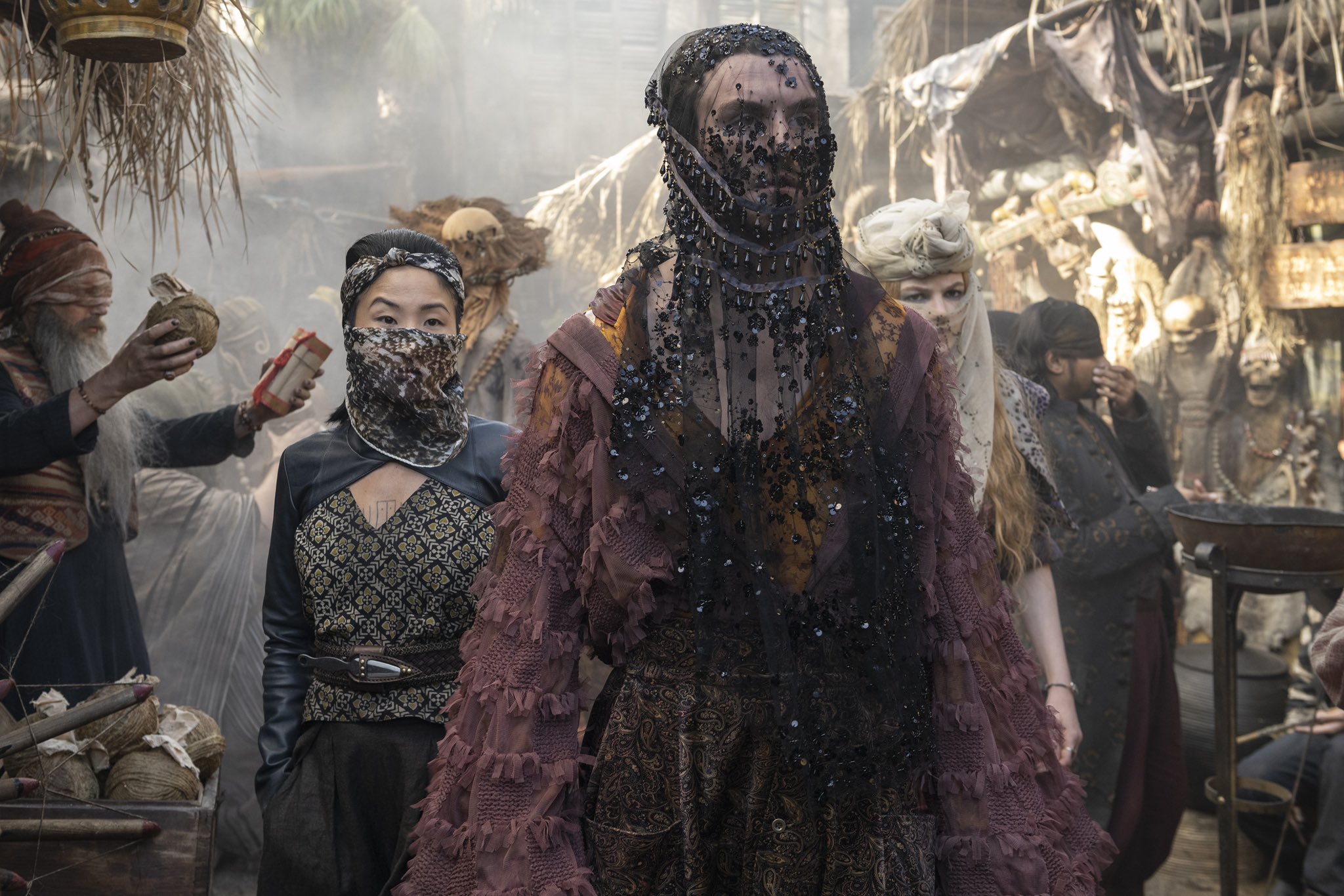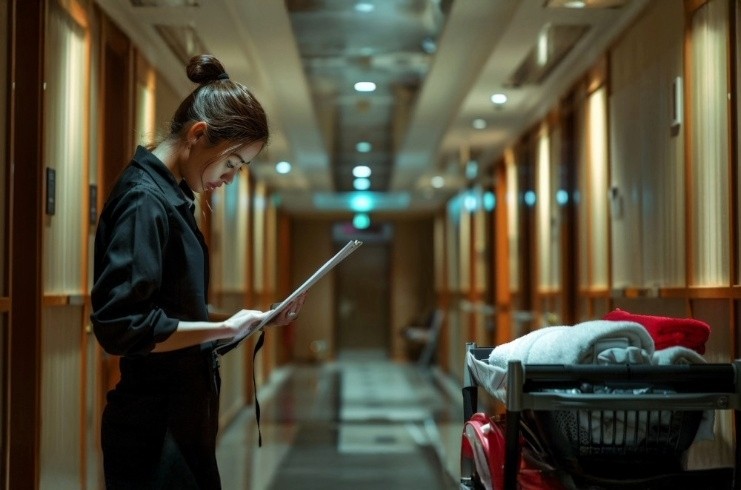‘The Handmaid’s Tale’ Season 6 Review: Hulu Series Ends With More of the Same Missed Opportunities
But Elisabeth Moss and Yvonne Strahovski still shine in the final chapters of the dystopian thriller The post ‘The Handmaid’s Tale’ Season 6 Review: Hulu Series Ends With More of the Same Missed Opportunities appeared first on TheWrap.

In its final season, Hulu’s Emmy-winning dystopian series “The Handmaid’s Tale” asks some familiar questions which many throughout history have struggled with to this day: What does effective resistance look like? Who can we look to for leadership and wisdom in times of great struggle?
In the world of “The Handmaid’s Tale,” the answer to both is June Osborne.
Based on the novel of the same name by Margaret Atwood, “The Handmaid’s Tale,” is a harrowing and inspiring tale about the power of one person to bravely stand up against injustice and change the world. It’s also a frustrating missed opportunity to learn from and engage with the real people and history from which this story draws its inspiration. These have always been the two sides of this series, and Season 6 leans into that strange dichotomy more than ever.
Season 6 begins right where the fifth season ended, with former handmaid June (Elisabeth Moss) and her young daughter coming face-to-face with her former nemesis and recent reluctant ally Serena Joy Waterford (Yvonne Strahovski) on a train full of Gilead refugees bound for Vancouver. In Season 5, Serena was finally forced to swallow a small dose of her own medicine when she was made to work as a servant in a Gilead sympathizer’s home in exchange for access to her own infant son. Turns out, Serena doesn’t like the taste of subjugation anymore than June did. And though Serena would like to think the two women are now on the same side, even friends, it’s clear from the jump that things are not so simple — and they’ll only get more complicated from there.
Meanwhile, June’s long suffering husband Luke (O-T Fagbenle) has been arrested for killing the man who attempted to assassinate June in Season 5. Aided by June’s best friend Moira (Samira Wiley) and U.S. government operative Mark (Sam Jaeger), Luke would like nothing more than to leave the nightmare of Gilead behind and resettle with his family in Canada, but life — and resistance organization Mayday — has other plans for all of them. Because Mayday has new information that may enable them to bring down Gilead for good.
Back in New Bethlehem — essentially Gilead 2.0, now with fewer uniforms and creepy rituals, and far less government-sanctioned rape and murder — June’s former lover, Nick (Max Minghella), initially believes that Gilead’s chief architect, jaded commander Lawrence (Bradley Whitford) was behind the thwarted attempt on June’s life, putting June’s allies in Gilead at odds with one another. However, it quickly becomes clear that neither commander is calling the shots anymore … which makes New Bethlehem’s prospects a little dicey. If it wasn’t obvious already, Season 6 makes it clearer than ever that “God’s will” was always just a convenient excuse for misogynistic men to seize power and subjugate women. They aren’t interested in a watered-down version of Gilead where they have to consider anyone’s free will but their own; to them, women are merely objects to control, and any attempt to give them back even a modicum of autonomy is unthinkable.

Case in point: Aunt Lydia (Ann Dowd), who must finally face the fact that there is no amount of training that she can give her “girls” that will give them good lives as handmaids. When she learns that her favorite pupil, Janine (Madeline Brewer), is being forced to work in the brothel Jezebel’s, her reality is turned upside down. She naively thought that if her handmaids were successful at “bearing fruit” (translation: having children), they would be allowed to retire in peace. But peace was never an option for women in Gilead.
Thus kicks off the final season of one of the angriest shows of the past decade. As the series builds toward what is sure to be an explosive series finale — possibly literally (critics were only provided with the first eight episodes of the 10 episode season), definitely figuratively — “The Handmaid’s Tale,” gives its characters more reasons to be mad than ever, as facades are stripped away, secrets are exposed and betrayal abounds. For viewers hungry for righteous indignation, “The Handmaid’s Tale,” offers a veritable feast.
One of the strongest aspects of this show has always been its characters, and Season 6 is no exception. Once again, Moss leads a stellar cast of actors, including Josh Charles, who joins the show this season as Nick’s father-in-law, Commander Wharton. Dowd, Whitford and Strahovski are also power hitters once again, but it’s difficult to pick an MVP in such a strong ensemble.
And it’s not just great performances; the character work in Season 6, especially everything involving Serena, is among the best the series has to offer. Serena Joy has had arguably the most interesting character arc throughout the series, and her story in the final season is as fascinating and compelling as ever. And it’s not just Strahovski that gets some juicy material to sink her teeth into; as the series winds down, it’s time to finally peel back the deepest layers to some of these characters, and viewers may be surprised at what they reveal.

Season 6 also doesn’t skimp on the action and intrigue, packing high-stakes secret missions, violent confrontations and gutting betrayals into every episode. This final season is eminently bingeable (after the first three episodes drop on April 8, viewers will be chomping at the bit for the remaining seven, which will release weekly), and each episode is tightly paced, with at least a few standout dramatic moments in each.
But one glaring weakness stands out in the series’ final season, made all the more frustrating because it is nothing new: Despite receiving consistent criticism regarding the series’ handling of race (or lack thereof) since its first season, “The Handmaid’s Tale,” remains stubbornly disinterested in exploring the intersectional identities of its characters.
Atwood’s novel made a point to state that Gilead was a society founded on white supremacy as much as it was fundamentalist Christianity, but the series intentionally discarded that first point, taking a colorblind approach to its casting without making any alterations to the story itself. Both Luke and Moira are Black, as is their ally Rita (Amanda Brugel); Max Minghella, who plays Nick, is mixed-race with Asian heritage, and actors of color have appeared in both major and minor roles spanning the entire spectrum of power since the show’s inception. But despite the series’ central themes of resisting oppression and dehumanization, “The Handmaid’s Tale” has never interrogated how diversifying the all-white narrative of Atwood’s novel might impact the on-screen version of Gilead, or how including characters of color may affect how the story engages with the real historical atrocities, particularly the enslavement of Black women, on which Atwood pulled much of the inspiration for her novel.
Viewers who have never taken issue with the show’s approach to race are unlikely to be bothered by its attitudes in Season 6; after all, they’re the same as they’ve always been, which is to say, insistently colorblind. But for those who have spent the past five seasons frustrated by the show’s refusal to engage meaningfully with the racial identities of its characters and the historical power structures that led to the creation of Gilead, it will be hard to ignore the optics of June, who is white, lecturing Moira and Luke on effective resistance tactics in Season 6. Historically, Black people, and especially Black women, have been at the forefront of organized resistance and social progress in the United States, but “The Handmaid’s Tale” has never acknowledged that legacy. Now, it feels safe to assume that it never will.
Similarly, while “The Handmaid’s Tale” has always been a tale of political resistance, the series has never seemed very concerned with how real opposition movements have functioned throughout history. Mayday is not only the only resistance group in the series; it may as well be the only resistance group that has ever existed for all the heed they pay to the effective movements of the past. They learn from no one but themselves, and don’t seem to have much of a plan beyond “burn it all down.” Of course, June is all too happy to light the torch and lead the way.
With no long-term strategy and no knowledge of what efforts have worked or failed in the past, it’s hard to envision how Mayday’s blunt-force tactics will result in a functional society. Maybe Gilead will indeed fall, but what will take its place?
Most would consider “The Handmaid’s Tale” to be a timely show, but part of being timely is a willingness to engage with the real-world context in which its viewers live. It’s difficult to be timely in a vacuum, yet that seems to be where “The Handmaid’s Tale” wants to exist.
It’s exhilarating TV, to be sure, but creating real, lasting societal change takes more than impassioned speeches and a sharp knife. As such, politically savvy viewers may come away feeling disappointed once they realize there’s not much else to June’s story. “The Handmaid’s Tale” had an opportunity to explore a complicated and nuanced topic — how to effectively topple a totalitarian theocracy — yet chose to sidestep it in favor of something much simpler.
How well the final season of “The Handmaid’s Tale” will sit with viewers will likely depend on how they feel about the show’s previous seasons, as the series’ last act is very much in line with what has come before Yet the series is just as captivating as it ever was, the acting just as good, the writing just as smart. The characters are all at their best (which is sometimes their worst), and the story continues to grab you by the collar and never let go.
In other words, “The Handmaid’s Tale” Season 6 delivers on the promises it’s been making since the beginning, for better and for worse. Buckle up for a furious and frenzied ride. Nolite te bastardes carborundorum.
“The Handmaid’s Tale” Season 6 premieres Tuesday, April 8, on Hulu.
The post ‘The Handmaid’s Tale’ Season 6 Review: Hulu Series Ends With More of the Same Missed Opportunities appeared first on TheWrap.



























































































![‘Fantastic Four: The First Steps,’ ‘Thunderbolts,’ ‘Tron: Aries,’ Top Walt Disney Studios Previews [CinemaCon]](https://cdn.theplaylist.net/wp-content/uploads/2025/04/03215859/FantasticFourSS.jpg)














































































































![Naming Your Baby? That Choice Could Haunt Them On Every Airline Upgrade List [Roundup]](https://viewfromthewing.com/wp-content/uploads/2025/04/upgrade-list.webp?#)





































































































































































































































































